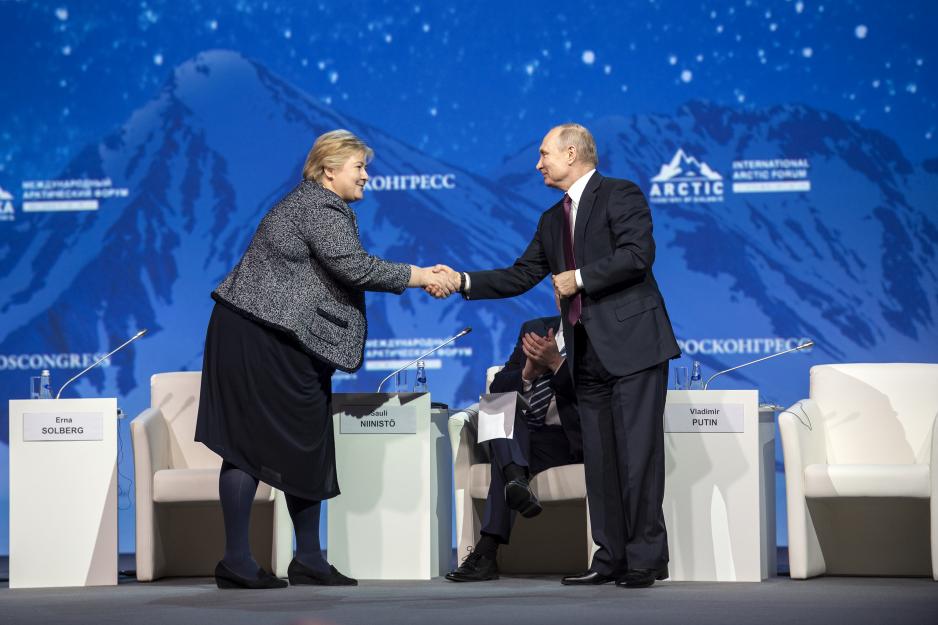International Summit in Russia: From Crimea Crisis to Climate Crisis

Erna Solberg and Vladimir Putin on stage during the Arctic Forum in St. Petersburg 9 April 2019. (Photo: Arne O. Holm)
COMMENTARY: The Crimea Crisis in 2014 pushed a deep wedge into the cooperation between the East and the West. Now, a new crisis has hit the Arctic, though with the opposite effect. Because the climate effect on Arctic cooperation is far greater than anyone would have been able to predict only a very few years ago.
ST. PETERSBURG: The Crimean crisis is replaced by the climate crisis when Arctic heads of state meet for dialogue. We could see that very clearly when Sergey Lavrov met with Ine Eriksen Søreide early Tuesday in St. Petersburg.
A backdrop of reconciliation
It was, first and foremost, about climate changes. Even China, attending the same meeting, used climate change as its pretext for demonstrating increasing interest and engagement in the Arctic.
We saw it again when president Vladimir Putin a couple of hours later invited heads of state from Norway, Finland, Iceland and Sweden to a joint dialogue about the Arctic before a full audience.
The climate crisis constituted a backdrop of reconciliation for the top leaders, who only as an exception touched on the underlying, international conflicts following in the wake of the Crimea.
Once the issue of western sanctions against Russia was brought up, it was pushed by a moderator focused more on international stock exchange prices on oil and gas than on cooperation between Arctic countries.
The core of the cooperation
International tensions do not cease even if Nordic heads of state meet with Russia on a stage in St. Petersburg. The western sanctions remain in place, and the Russian defense of her annexation of the Crimea remains the same.
The arguments are – as expected – unchanged.
Those who have argued that the high-level meetings in Russia this week signify a change of atmosphere in the relationship between the East and the West have therefore exaggerated.
Those who cultivate Arctic dialogue as a peacekeeping measure in and of itself, however, have seen their dreams come true.
The core of this cooperation is focused on an international organization that rarely receives much media attention; the Arctic Council.
In St. Petersburg, nevertheless, this formalized cooperation between eight Arctic states is elevated to a league of its own. The Council, which consistently avoids discussing the international tension, works as an ongoing meeting place for politicians, academics, indigenous people and others with a keen interest in the Arctic.
Climate threat dominates
However, one key member of the Arctic family was missing on stage when the high-level dialogue took place. The USA has not had any Arctic ambitions for quite some time, though with the current challenge stemming from Russian-Chinese cooperation in the Arctic, the USA has announced increased presence in the High North.
When this topic comes up, both the Russian president and the Foreign Minister shift their body language. Potential American plans about sending navy vessels to the North is described as a violation of public international law and a militarization of the Arctic.
The answer and explanation from the West is Russian military armament in the same area.
However, in St. Petersburg, the environment is the winner – if all the promises are followed up by actions. While the USA wants to cancel the Paris Accord, Putn even announced that it is to be incorporated into Russian legislation.
There is still a long way to go to solve the climate crisis, however, it clearly eases the dialogue between Nordic neighbors and their great eastern neighbor.
That is often how it goes when parties share an external enemy.
If we are to believe the heads of state of Russia, Norway, Iceland, Finland and Sweden, climate change represents a much higher threat to the Arctic than does the international tension between the East and the West.
This commentary originally appeared in Norwegian and has been translated by HNN's Elisabeth Bergquist.

